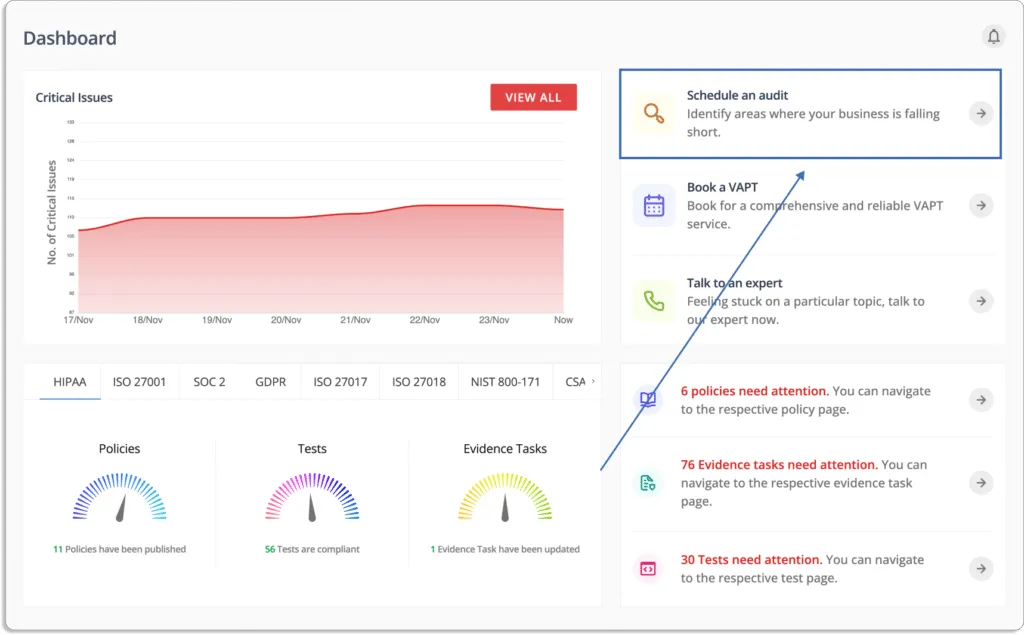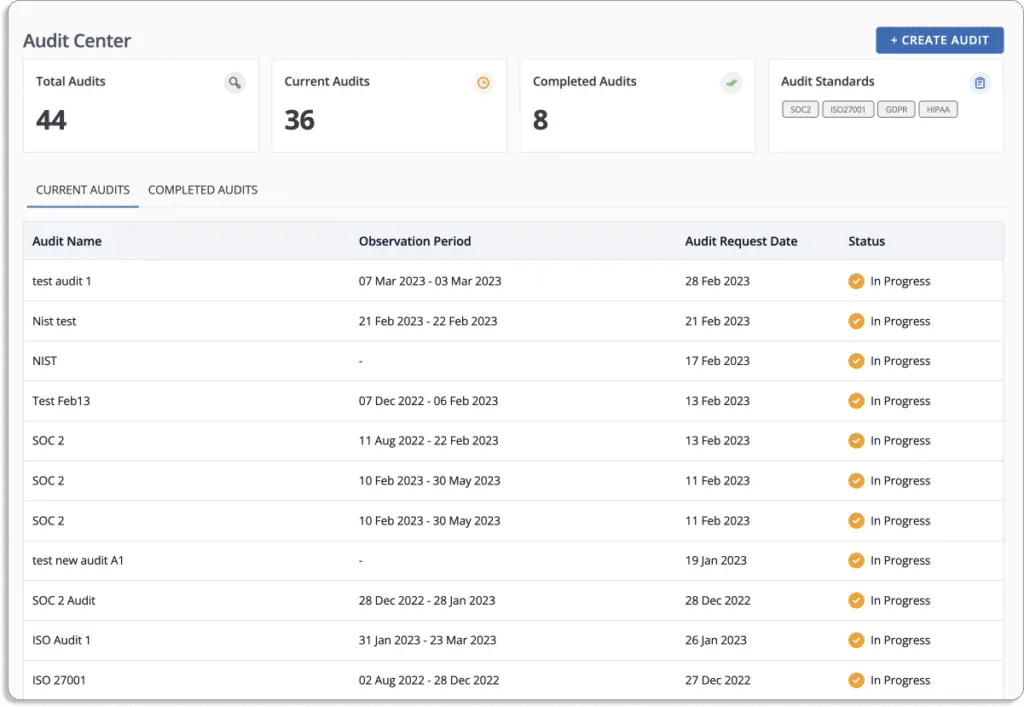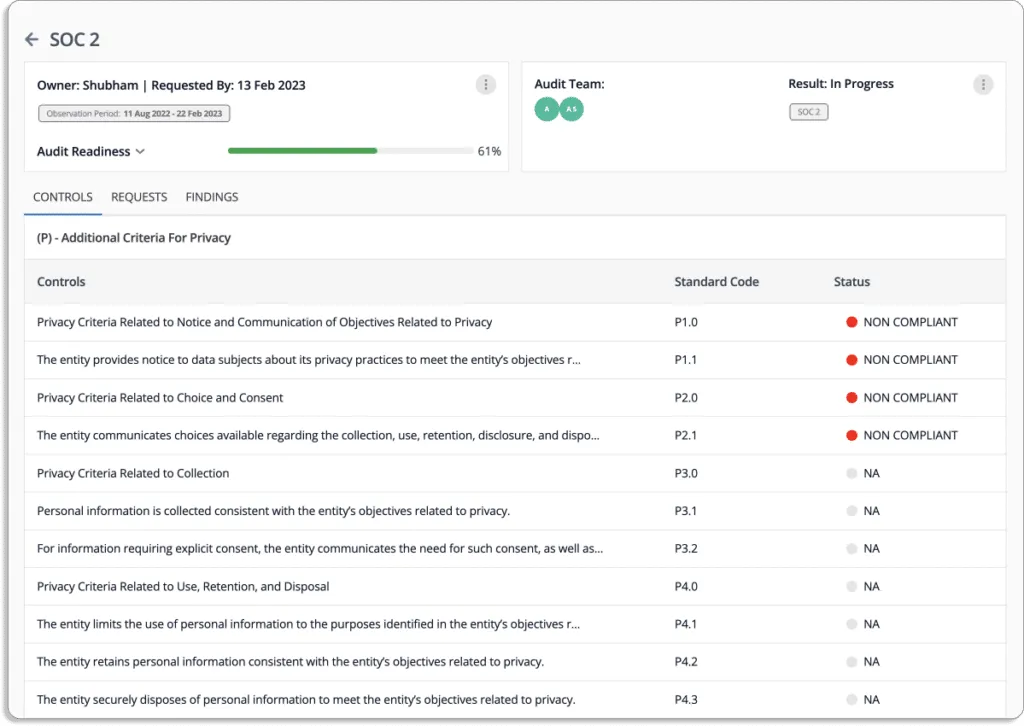Choose risk-first compliance that’s always on, built for you.
Go back to blogs
Pros and Cons of a Boutique Auditing Firm Versus Big 4
Last updated on
February 5, 2025
min. read

You might come across various auditors for your compliance audit form when exploring. But the question remains the same, which one should you opt for: One of the “big four” audit firms or a “boutique” firm? Well, both have their advantages and disadvantages, which you must get well-versed in before making a choice.
This article is all about it, listing the various factors you must consider before choosing an auditor.
Selecting an appropriate external auditor is crucial, as the auditor will work closely with your organization for multiple years, and their input is vital to your business’s success. An external audit should ensure compliance and provide valuable insights to improve your business. It is important to choose an auditor with the right qualifications, experience, technology, and approach to achieve this. This could be a large firm, a Big 4, or a smaller auditing company.
When an audit is performed for regulatory compliance, the lead auditor must meet the requirements set by the regulator. For instance, if the audit is to comply with ASIC regulations, only a Registered Company Auditor (RCA) can conduct the audit.
In addition, it is beneficial to choose an auditor with industry experience as this leads to a more efficient audit and minimizes generic questions. This also allows them to provide more relevant value-added services and translate their findings into concrete actions that benefit your business.
This article discusses the benefits and drawbacks of working with a “boutique” auditing firm versus a “Big 4” firm.
Who are the Big 4?
1. Deloitte
Deloitte is one of the world’s largest accounting and consulting firms, with a global presence in 150 countries and territories. The firm has been operating for over 175 years and serves many clients, including many Fortune 500 companies. They have a total of 126 offices, and their workforce is the largest among the Big 4 accounting firms.
The company’s services are divided into three main categories: 27% accounting and audit, 17% tax, and 52% management advisory services (MAS), with the remaining 4% being other services. Compared to other firms of the Big 4, Deloitte generates a smaller percentage of its revenue from audit services, and a more significant portion of revenue comes from its consulting services.
2. PwC
PwC is a global professional services firm that operates in 156 countries worldwide. It is headquartered in London, UK, and is the largest of the Big 4 accounting firms by revenue, at $35.4 billion. 36% of PwC’s revenue comes from accounting and audit, 27% from tax, and 37% from MAS. In 2016, the company initiated a digital transformation to improve its client service offerings. PwC is ranked as the #2 top firm by accounting today.
3. EY
EY, a top accounting firm ranking #3 on accounting today’s list, offers a diverse range of services, with 28% of their work focused on accounting and audit, 29% on tax, and 33% on management advisory services, with the remaining 10% dedicated to other services. Over a thousand public companies and six of the top ten Fortune 500 companies are audited by the company. Additionally, in response to the COVID-19 pandemic, EY has implemented a hybrid audit model that combines remote and in-person work, catering to the needs of their clients. With a large staff and strong overall revenue growth, EY is considered one of the larger companies among the Big 4.
4. KPMG
KPMG, a leading global professional services firm, has 99 offices worldwide. It is known for its expertise in accounting, audit, tax, and management advisory services, with a breakdown of 30%, 29%, and 41%, respectively. KPMG is ranked as the #4 firm by accounting today’s top 100 and is known for its international presence, strategic partnerships with technology providers, and strong consultancy and advisory practice.
What is a Boutique Auditing Firm?
Boutique accounting firms, known for their specialization in a specific area of accounting, provide exceptional customer service to middle-market clients. Their smaller size allows for personalized attention and a low turnover rate, leading to a deep understanding of client needs and efficient work. Clients also have the advantage of dealing directly with the firm’s owner, who is often an expert in the field. The expertise and specialization that boutique firms develop over time set them apart from larger firms, where clients may work with associates rather than experts.
Pros of working with a “Big 4” company
When considering partnering with a Big four firm, there are several advantages.
- One of the main benefits is the power of the Big 4 brand. Organizations that share SOC 2 reports with a Big 4 logo are often viewed as trustworthy and credible.
- Additionally, as large and established organizations, Big 4 firms have the resources and capabilities to take on projects promptly and offer a broad range of services, such as taxation, consultancy, and more.
- They have also developed stringent quality assurance processes and have a wealth of experience dealing with clients, particularly those of considerable size.
- The Big 4 firms have a reputation for excellent client relationship management and a large pool of talented individuals.
Cons of working with a “Big 4” company
There are a few disadvantages as well to get your audit done by a “big 4” accounting firm, which includes:
- Big 4 accounting firms come with a high price tag due to their quality assurance, methodology, and large headcount. The brand name and reputation come with a higher cost, and the cost of audit services can vary depending on your unique needs.
- When it comes to compliance and audits, the process is tailored to your company’s specific needs, so it can be difficult to estimate costs.
- With multiple projects on the go and a high turnover rate, it can be challenging to build a long-term relationship with an auditor, which can limit the personal attention and guidance that you receive.
- Additionally, big 4 firms offer a wide range of services, including tax advice and consulting, which may create potential conflicts of interest during the audit process.
- With a big firm, it’s more likely that you’ll be working with a manager or senior rather than a partner, which can limit the amount of attention and guidance you receive during the audit process.
Pros of working with a Boutique Auditing Firm
- Boutique audit firms offer a cost-effective alternative to the more expensive Big 4 audit firms. They may not have the same exhaustive methodology or assurance as the Big 4, but they can still meet most customers’ needs.
- Compliance with frameworks such as SOC 2 and ISO 27001 requires regular audits, and having the same auditor conduct these audits can make the process more efficient and provide deeper insight into the business and its goals.
- Additionally, working closely with senior staff members and having them easily accessible can provide valuable guidance and advice on enhancing security posture.
Cons of working with a Boutique Auditing Firm
Boutique firms may not have the same level of recognition or prestige as larger, star-studded companies. These smaller companies may also have more limited resources or specialized areas of expertise. Furthermore, it’s important to consider the quality of their audit reports and whether they possess the necessary understanding and experience with specific subjects like enterprise security for third-party vendors and relevant InfoSec credentials. Additionally, as your business grows, the services provided by a boutique firm may no longer be sufficient, and you may need to look for a new solution.
A Small Firm vs. a Large Firm
Cost acts as one of the major considerations when choosing an auditor. The prestigious Big 4 firms (PwC, Deloitte, Ernst & Young, and KPMG) may come at a higher cost, but in return, you get certified by a well-known and highly respected company. For some organizations, this extra cost is worth it, while others may prefer a reputable and accredited boutique auditor.
Make sure you get answers to the following questions when deciding which firm to choose:
- Does the brand of the Big 4 carry any weight to your stakeholders? Will they be more likely to trust the choice if it comes from a top-tier company?
- Are your customers more likely to trust the audit findings and your company’s commitment to information security if a Big 4 firm conducts the audit?
- Can you use a compliance solution to streamline the audit process?
One option to consider is using an all-in-one GRC solution like Scrut to handle all the tedious tasks associated with HIPAA, ISO 27001, and 20+ compliance frameworks. Scrut can fully manage the auditor for you, resulting in a quick, stress-free process for earning your compliance certification.

Scrut smartGRC automates and streamlines time-consuming audit tasks, from preparation to analysis. Using Scrut, you can simplify the communication process with your auditor. Scrut offers a platform where you can connect with auditors from both the “Big 4” and boutique firms.
Scrut’s Audit Center dashboard is a tool that provides companies with a centralized location to manage their audit process. It gives users a complete overview of their audit by displaying the audits that are in progress and the ones that have been completed. This allows companies to have good visibility of the overall status of their audits and stay informed about the progress of each audit.

Some of the features of Scrut’s Audit Center dashboard may include:
- A list view that shows the audits that are in progress and the ones that have been completed.
- A detailed view of each audit includes information about the scope of the audit, the auditors assigned to it, and the status of each task.

- Reports and metrics provide insights into the audit process, such as the number of audits completed, the number of findings identified, and the resolution rate for those findings.
- Collaboration feature that allows team members to share and discuss findings, assign tasks, and manage the audit process.
Overall, Scrut’s Audit Center dashboard can be useful to the companies as it provides an organized way to manage and monitor their audits and also allows to have better control over the process, thereby ensuring that the company is compliant with regulations and that the security and controls are up to date.
Here are some reviews from our customers:



Schedule a demo to see how Scrut can help you with your audit process.
Table of contents


















